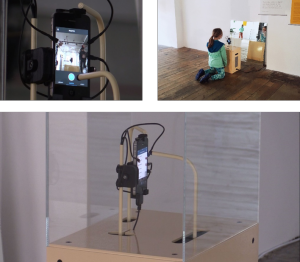By Nichola Kent-Lemon
In recent years digital technology has liberated us, saving us time, giving us access to more methods of communication than we ever thought possible and bringing us closer to the people we love. But it is becoming increasingly apparent that there is a darker side to digital.
The BBC recently challenged 1000 students to turn off their technology for a week long ‘digital detox’, an experiment that demonstrated a powerful digital dependence. The majority failed even to complete the challenge. Concerns are being raised about our evolving relationships with digital technology, with very little known about the long term implications, particularly for younger generations.
In July of 2015, Northstar teamed up with creative agency Six:Thirty to generate a design exhibition inspired by the increasingly complex relationship between our real world and digital lives.
To support the exhibition Northstar ran an online research project investigating anxieties linked to digital communication technology. Participants were invited to join an online conversation, exploring thoughts, feelings and behaviours resulting from digital interactions. The conversation started very wide, and, through identification of recurring ideas, it was gradually narrowed into specific themes with the potential to produce meaningful subject matter for the exhibition.
Several fascinating themes emerged, these are just a few:
Social muting – With increasing time spent on social media platforms, we find that nothing is new information when it comes to our real world interactions. Consequently, we see people ‘muting’ conversations or disengaging in the real world. What should be a special moment with friends or family members has been watered down and nullified. This dulling of real life events acts in a loop. The more social muting happens, the duller real life actions become. In the end, we can only get our social fix through digital.
Social cleansing – People are starting to socially cleanse peers from their daily interactions based on their online profiles – there is a sense that online posts are representative of entire realities and if people’s lives don’t look interesting online, they may not be worth meeting up with. One too many baby pictures can cause friends at different life stages to start mentally disconnecting.
Bringing out my worst – People feel their use of social media more often than not brings out the worst in them. They feel it makes them more judgemental, more narcissistic, it needlessly dials up jealousy, and if that is not enough, it also makes them increasingly critical of people they typically like. Emotional censorship is much more difficult when we are not physically face to face with those we are criticising, envying or judging. Physical separation afforded by digital interactions can allow our more negative reactions to go unchecked.
Maintaining the dream – While we all get a kick out of creating ideal versions of ourselves for our online profiles, the pressure to maintain these online realities can feel very oppressive. If your Instagram “you” is all about a jet setting mogul, sustaining this impression can be hard work. What we learn is that sometimes trying to maintain these realities pushes people do things in the real world that they don’t actually want to do, all for the sake of their online selves.
Themes that resonated best with the public, and provided enough breadth and nuance to facilitate multiple creative articulations, were passed onto designers. One such example was crafted by designer Daniel Armengol Altayó who produced an instillation, ‘#artificialselfie’, a machine that takes selfies of itself and posts them on Instagram, demonstrating a ‘paradigmatic way to prove to the contemporary world that one exists.’ The machine tirelessly repeats the same action, throwing our modern day selfie obsession into stark relief. In the end we are not machines, and for us this repetitive behaviour can be tiring to maintain.
The exhibition, entitled ‘Unread Messages’, opened on 10th March this year at the Arum Gallery in Covent Garden and will run until 9th April.
Northstar are holding a follow up event in London on 21st April entitled ‘Unread Messages: revealing the darker side of digital and what it means for brands’. The event will bring together speakers from a cross-section of disciplines to discuss the human relationship with digital technology and how brands should adapt in response.
Nichola Kent-Lemon, Research Director, Northstar Research Partners, @northstarlondon




2 comments
Scarily interesting study, Nichola. The relationship between our real lives and the digital world are now and forever intertwined. As i was reading about \’social muting\’ I couldn\’t stop my mind from taking me back to those dystopian worlds brought to us by \”The Black Mirror\” TV series. In particular the last episode where the characters get \’blocked\’… in real life. A future nightmare? Or a not-so-unlikely reality? Time will tell…
This is excellent.Am a technologist in statistics and equally a financial management (PGD) holder and also working in a polytechnic as aforementioned.
so would like to be contacted in any research you would like to carry out, because am looking out for researchers to work with with respect to conferences and researches in subsequent time.
Thanks in nation building
Best regards,
+2348062884359